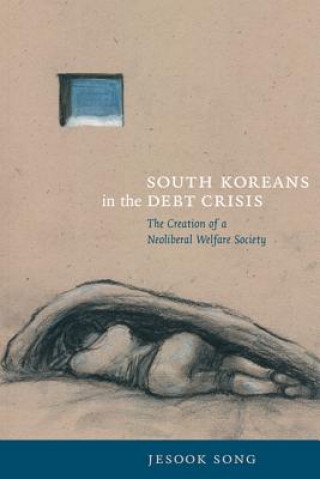
Kód: 04938951
South Koreans in the Debt Crisis
Autor Jesook Song
"South Koreans in the Debt Crisis" is a detailed examination of the logic underlying the neoliberal welfare state that South Korea created in response to the devastating Asian Debt Crisis (1997-2001). Jesook Song argues that while ... celý popis
- Jazyk:
 Angličtina
Angličtina - Väzba: Brožovaná
- Počet strán: 232
Nakladateľ: Duke University Press, 2009
- Viac informácií o knihe

32.80 €
Bežne: 32.84 €
Ušetríte 0.04 €
Dostupnosť:
50 % šanca Máme informáciu, že by titul mohol byť dostupný. Na základe vašej objednávky sa ho pokúsime do 6 týždňov zabezpečiť.
Máme informáciu, že by titul mohol byť dostupný. Na základe vašej objednávky sa ho pokúsime do 6 týždňov zabezpečiť.Prehľadáme celý svet
Mohlo by sa vám tiež páčiť
-

Dune
13.07 € -

Haunting Adeline
30.76 € -

Berserk Deluxe Volume 2
52.53 € -

White Nights
3.57 € -24 % -

Powerless
12.46 € -4 % -

Atomic Habits
16.04 € -15 % -

Dune Messiah
8.99 € -20 % -

Berserk Deluxe Volume 3
52.84 € -

One Day
12.56 € -13 % -

Berserk Deluxe Volume 1
44.46 € -13 % -

Iron Flame
16.45 € -24 % -

Surrounded by Idiots
10.21 € -15 % -

Harry Potter and the Prisoner of Azkaban (Minalima Edition)
27.79 € -32 % -

Gravity Falls Journal 3
21.97 € -

Heaven Official's Blessing: Tian Guan Ci Fu (Novel) Vol. 1
21.97 € -

The Creative Act
24.01 € -13 % -

Dune
11.34 € -6 % -

Hunting Adeline
31.78 € -

A Little Life
17.57 € -

Children of Dune
8.78 € -22 % -

Heaven Official's Blessing: Tian Guan Ci Fu (Novel) Vol. 2
20.33 € -2 %
Darčekový poukaz: Radosť zaručená
- Darujte poukaz v ľubovoľnej hodnote, a my sa postaráme o zvyšok.
- Poukaz sa vzťahuje na všetky produkty v našej ponuke.
- Elektronický poukaz si vytlačíte z e-mailu a môžete ho ihneď darovať.
- Platnosť poukazu je 12 mesiacov od dátumu vystavenia.
Informovať o naskladnení knihy
Zadajte do formulára e-mailovú adresu a akonáhle knihu naskladníme, zašleme vám o tom správu. Postrážime všetko za vás.
Viac informácií o knihe South Koreans in the Debt Crisis
Nákupom získate 81 bodov
 Anotácia knihy
Anotácia knihy
"South Koreans in the Debt Crisis" is a detailed examination of the logic underlying the neoliberal welfare state that South Korea created in response to the devastating Asian Debt Crisis (1997-2001). Jesook Song argues that while the government proclaimed that it would guarantee all South Koreans a minimum standard of living, it treated as most deserving of assistance those citizens perceived as embodying the neoliberal ideals of employability, flexibility, and self-sufficiency. Song demonstrates that the government was not alone in drawing distinctions between the 'deserving' and the 'undeserving' poor. Progressive intellectuals, activists, and organizations were also drawn into the neoliberal reform project. Song traces the circulation of neoliberal concepts throughout South Korean society, among government officials, the media, intellectuals, NGO members, and educated underemployed people working in public works programs. She analyzes the embrace of partnerships between NGOs and the government, the frequent invocation of a pervasive decline in family values, the resurrection of conservative gender norms and practices, and the promotion of entrepreneurship as the key to survival. Drawing on her experience during the Crisis as an employee in a public works program in Seoul, Song provides an ethnographic assessment of the efforts of state and civilians to regulate social insecurity, instability, and inequality through assistance programs. She focuses specifically on efforts to help two populations deemed worthy of state subsidies: the 'IMF homeless', people temporarily homeless but considered employable, and the 'new intellectuals' young adults who had become redundant during the Crisis but had the high-tech skills necessary to lead a transformed post-Crisis South Korea.
 Parametre knihy
Parametre knihy
Zaradenie knihy Knihy po anglicky Economics, finance, business & management Economics Welfare economics
32.80 €
- Celý názov: South Koreans in the Debt Crisis
- Podnázov: The Creation of a Neoliberal Welfare Society
- Autor: Jesook Song
- Jazyk:
 Angličtina
Angličtina - Väzba: Brožovaná
- Počet strán: 232
- EAN: 9780822344810
- ISBN: 0822344815
- ID: 04938951
- Nakladateľ: Duke University Press
- Hmotnosť: 340 g
- Rozmery: 235 × 156 × 13 mm
- Dátum vydania: 18. August 2009
Osobný odber Bratislava a 2642 dalších
Copyright ©2008-24 najlacnejsie-knihy.sk Všetky práva vyhradenéSúkromieCookies


 21 miliónov titulov
21 miliónov titulov Vrátenie do mesiaca
Vrátenie do mesiaca 02/210 210 99 (8-15.30h)
02/210 210 99 (8-15.30h)